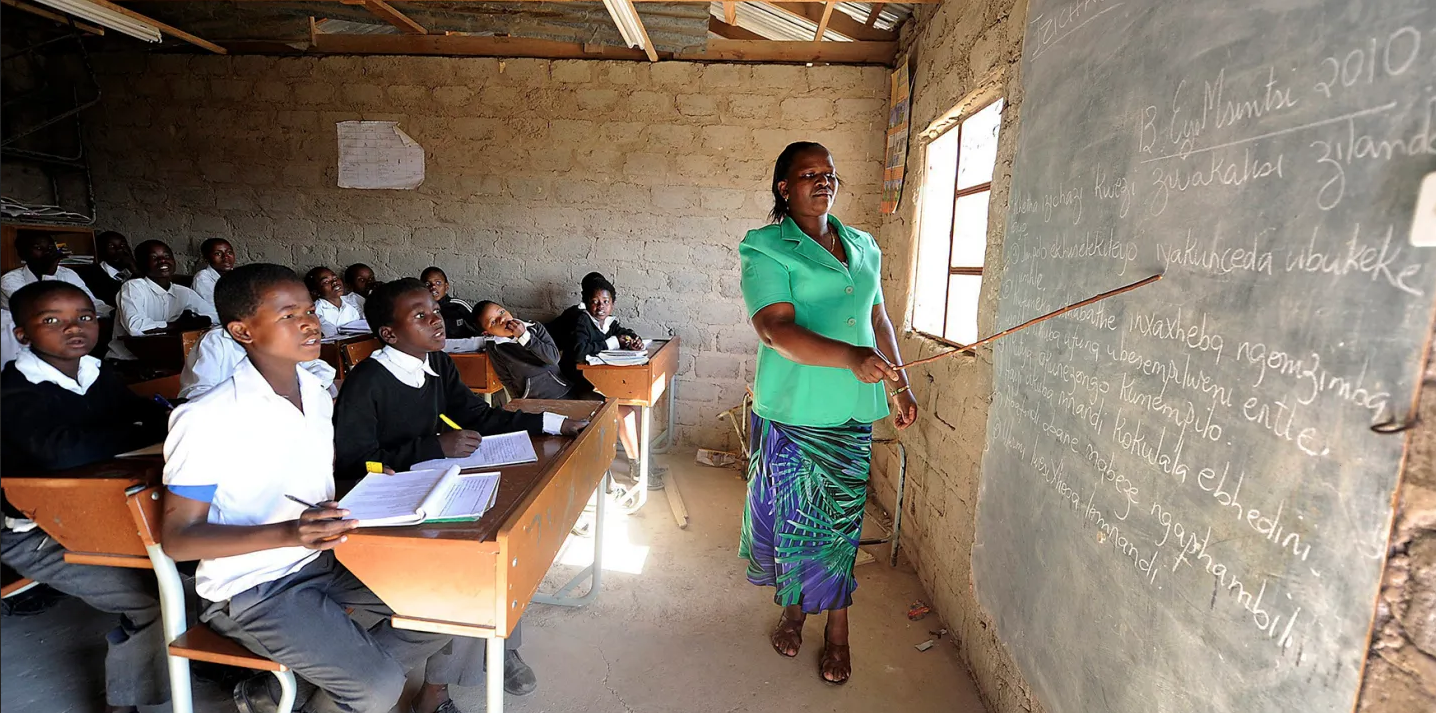A STUDY of the philosophy of education seems imperative today, for we are in a critical era of transition.
There has always been change, but seldom at our present accelerated rate, creating in many individuals what I term the sickness of “future shock.” In such an age, it is easy for people to embrace more and more change with little thought to eventual consequences or to resisting change and keeping old values no matter what.Educational philosophers, regardless of the particular theory they embrace, suggest that the solution to our problems can best be achieved through critical and reflective thinking.In one basic sense, we can say that the philosophy of education is the application of philosophical ideas to educational problems.We can also say with equal force that the practice of education leads to a refinement of philosophical ideas.From this point of view, educational philosophy is not only a way of looking at ideas but also of learning how to use them in the best way.When educators do things simply because they were done in the past, there is no intelligent philosophy of education involved.A philosophy of education becomes significant at a point where educators recognise the need to think clearly about what they are doing in the larger context of individual and social development.It is interesting to note that many major philosophers have written about education.This is probably because education is such an integral part of life that it is difficult not to think about it.Humans are not only tool-making beings but also ‘educating beings’, since education has been closely connected with the development of civilised beings in human history.Thinking about life in general has often been viewed as a way of bringing a better life into existence.The study of philosophy does not guarantee that individuals will be better thinkers or educators, but it does provide a valuable base to help us think more clearly.Traditionally, the word philosophy has meant the pursuit of wisdom.This does not imply that philosophy is the provider of answers in the world; rather, it offers an avenue for serious enquiry into ideas and traditions.Philosophers have been acute observers of the human condition and have articulated their observations in ways that are instructive.Educators are not only aided by a careful and systematic approach to ideas that philosophers have fostered, but they can also gain inspiration from philosophy and develop insights into educational problems.While educators may choose to disregard the philosophical approach to problems – in doing so, they ignore a vital and important body of knowledge or thought.One of the roles of philosophy has been to examine critically the intellectual tools of any given era.Another role has been to suggest alternative methods of thinking.Still another has been to develop sensitivity to the logic and language we use in constructing solutions to problems in education and society.It is possible to trace the history of ideas by tracing the development of philosophical thought, and the history of philosophy reflects some of humanity’s best thinking, our collective wisdom, so to speak.It could be said that to think philosophically is to reflect upon who we are, what we are doing, why we are doing it, and how we justify all these things.Education is involved with both the world of ideas and the world of practical activity – good ideas can lead to good practices, and good practices can lead to good ideas.In order to behave intelligently in the educational process, the educator needs the things philosophy can provide – that is, an understanding of thinking processes and the nature of ideas, the language we use to describe education and how these may interact with practical affairs.For the educator, philosophy is not simply a professional tool but a way of improving the quality of life because it helps us gain a wider and deeper perspective on human existence and the world around us.In spite of the depth of thought it provides, philosophy does not appeal to many people because philosophers disagree and there are no clear-cut answers to philosophical problems.However, too often than not, it is from such disagreement that the search for new social, political, economic, religious, and educational systems have developed.One can find philosophical disagreements on practically every issue.It may be that those who look upon disagreement as a negative factor and prefer clear-cut answers overlook important concerns about the development of civilisation – that is, if there had been no disagreement about ideas, purposes, and methods, we would probably still be in the Stone Age.Disagreement has often brought about change and it still continues to do so.Many differences in educational viewpoints have arisen because of the changes that have occurred in society.We know that social development often necessitates changes of both viewpoint and behaviour.Of course, this will probably always go on.It would be gratifying if all educational changes we have today resulted from people reflectively examining issues and clarifying directions.But we know that this is usually not the case.Many past events that affected social and cultural developments were largely out of human control, and although people often tried to study the changes, they had little control over developments.Even more to the point, many social and cultural changes that could have been controlled have wrecked havoc in history.Consequently, much philosophising in the historical context was done after the fact – and events ran their own capricious course.However, as people sought to develop more control over social forces through education, they were faced with the problem of dealing with control in some direction.This has led to questions of whether or not the controls do more harm than good.For example, today we can systematically control individuals and groups to some extent through psychological conditioning in the educational process, but whether such control is good or bad is debatable.Thus the need arises for philosophers to examine the value of controls to uncover the basic assumptions behind those controls and to study the values involved in human life.One concern when dealing with philosophy is that people come to it looking for the answers to debatable issues, and when they fail to find them, they reject philosophy in the same way a spoiled child might reject a parent who does not have all the answers to its problems.A tragic error is made in rejecting philosophies because they are old or because they are difficult to understand.Practically everything we do in education reflects some point of view.That view may not be readily apparent to the learner, parent or teacher.It may be that the point of view is unclear, or a loose collection of ideas, all lumped together without much logic and coherence.What is needed in such cases, is clarification and sorting out.But because many teachers lack skill with the tools that promote clarification, they continue to drift aimlessly in a sea of rhetoric and patchwork panaceas.Indeed, there does seem to be a deep-seated feeling of drift today and much of the drift of modern education attests to this aimlessness.Attempts to solve this problem often result in a chaotic jumble of programs and superficial bickering among ideological camps.”Practical” educators assume we should throw out philosophy and get on with the task at hand.The problem with a “practical” outlook is that its advocates approach educational problems with the same old attitudes and remedies.That outlook itself is a “theory”, a set of assumptions for which the last word is yet to be spoken.I come to the conclusion, derived from my arguments in this text, that educators – like everyone else – are caught up in their own humanity.There is no certainty with regard to all facets of life in any known approach to education, for the perfect approach is yet to be invented.We are therefore left with the necessity to think about what we do, to attempt to reason out and justify our actions so that they are coherent, meaningful, and directed toward desirable educational ends.This is the challenge for the educational sector!Austin, M. Samupwa P O Box 1706, SWAKOPMUND Job: Education Inspector based in SwakopmundIn such an age, it is easy for people to embrace more and more change with little thought to eventual consequences or to resisting change and keeping old values no matter what.Educational philosophers, regardless of the particular theory they embrace, suggest that the solution to our problems can best be achieved through critical and reflective thinking.In one basic sense, we can say that the philosophy of education is the application of philosophical ideas to educational problems.We can also say with equal force that the practice of education leads to a refinement of philosophical ideas.From this point of view, educational philosophy is not only a way of looking at ideas but also of learning how to use them in the best way.When educators do things simply because they were done in the past, there is no intelligent philosophy of education involved.A philosophy of education becomes significant at a point where educators recognise the need to think clearly about what they are doing in the larger context of individual and social development.It is interesting to note that many major philosophers have written about education.This is probably because education is such an integral part of life that it is difficult not to think about it.Humans are not only tool-making beings but also ‘educating beings’, since education has been closely connected with the development of civilised beings in human history.Thinking about life in general has often been viewed as a way of bringing a better life into existence.The study of philosophy does not guarantee that individuals will be better thinkers or educators, but it does provide a valuable base to help us think more clearly.Traditionally, the word philosophy has meant the pursuit of wisdom.This does not imply that philosophy is the provider of answers in the world; rather, it offers an avenue for serious enquiry into ideas and traditions.Philosophers have been acute observers of the human condition and have articulated their observations in ways that are instructive.Educators are not only aided by a careful and systematic approach to ideas that philosophers have fostered, but they can also gain inspiration from philosophy and develop insights into educational problems.While educators may choose to disregard the philosophical approach to problems – in doing so, they ignore a vital and important body of knowledge or thought.One of the roles of philosophy has been to examine critically the intellectual tools of any given era.Another role has been to suggest alternative methods of thinking.Still another has been to develop sensitivity to the logic and language we use in constructing solutions to problems in education and society.It is possible to trace the history of ideas by tracing the development of philosophical thought, and the history of philosophy reflects some of humanity’s best thinking, our collective wisdom, so to speak.It could be said that to think philosophically is to reflect upon who we are, what we are doing, why we are doing it, and how we justify all these things.Education is involved with both the world of ideas and the world of practical activity – good ideas can lead to good practices, and good practices can lead to good ideas.In order to behave intelligently in the educational process, the educator needs the things philosophy can provide – that is, an understanding of thinking processes and the nature of ideas, the language we use to describe education and how these may interact with practical affairs.For the educator, philosophy is not simply a professional tool but a way of improving the quality of life because it helps us gain a wider and deeper perspective on human existence and the world around us.In spite of the depth of thought it provides, philosophy does not appeal to many people because philosophers disagree and there are no clear-cut answers to philosophical problems.However, too often than not, it is from such disagreement that the search for new social, political, economic, religious, and educational systems have developed.One can find philosophical disagreements on practically every issue.It may be that those who look upon disagreement as a negative factor and prefer clear-cut answers overlook important concerns about the development of civilisation – that is, if there had been no disagreement about ideas, purposes, and methods, we would probably still be in the Stone Age.Disagreement has often brought about change and it still continues to do so.Many differences in educational viewpoints have arisen because of the changes that have occurred in society.We know that social development often necessitates changes of both viewpoint and behaviour.Of course, this will probably always go on.It would be gratifying if all educational changes we have today resulted from people reflectively examining issues and clarifying directions.But we know that this is usually not the case.Many past events that affected social and cultural developments were largely out of human control, and although people often tried to study the changes, they had little control over developments.Even more to the point, many social and cultural changes that could have been controlled have wrecked havoc in history.Consequently, much philosophising in the historical context was done after the fact – and events ran their own capricious course.However, as people sought to develop more control over social forces through education, they were faced with the problem of dealing with control in some direction.This has led to questions of whether or not the controls do more harm than good.For example, today we can systematically control individuals and groups to some extent through psychological conditioning in the educational process, but whether such control is good or bad is debatable.Thus the need arises for philosophers to examine the value of controls to uncover the basic assumptions behind those controls and to study the values involved in human life.One concern when dealing with philosophy is that people come to it looking for the answers to debatable issues, and when they fail to find them, they reject philosophy in the same way a spoiled child might reject a parent who does not have all the answers to its problems.A tragic error is made in rejecting philosophies because they are old or because they are difficult to understand.Practically everything we do in education reflects some point of view.That view may not be readily apparent to the learner, parent or teacher.It may be that the point of view is unclear, or a loose collection of ideas, all lumped together without much logic and coherence.What is needed in such cases, is clarification and sorting out.But because many teachers lack skill with the tools that promote clarification, they continue to drift aimlessly in a sea of rhetoric and patchwork panaceas.Indeed, there does seem to be a deep-seated feeling of drift today and much of the drift of modern education attests to this aimlessness.Attempts to solve this problem often result in a chaotic jumble of programs and superficial bickering among ideological camps.”Practical” educators assume we should throw out philosophy and get on with the task at hand.The problem with a “practical” outlook is that its advocates approach educational problems with the same old attitudes and remedies.That outlook itself is a “theory”, a set of assumptions for which the last word is yet to be spoken.I come to the conclusion, derived from my arguments in this text, that educators – like everyone else – are caught up in their own humanity.There is no certainty with regard to all facets of life in any known approach to education, for the perfect approach is yet to be invented.We are therefore left with the necessity to think about what we do, to attempt to reason out and justify our actions so that they are coherent, meaningful, and directed toward desirable educational ends.This is the challenge for the educational sector!Austin, M. Samupwa P O Box 1706, SWAKOPMUND Job: Education Inspector based in Swakopmund
Stay informed with The Namibian – your source for credible journalism. Get in-depth reporting and opinions for
only N$85 a month. Invest in journalism, invest in democracy –
Subscribe Now!










